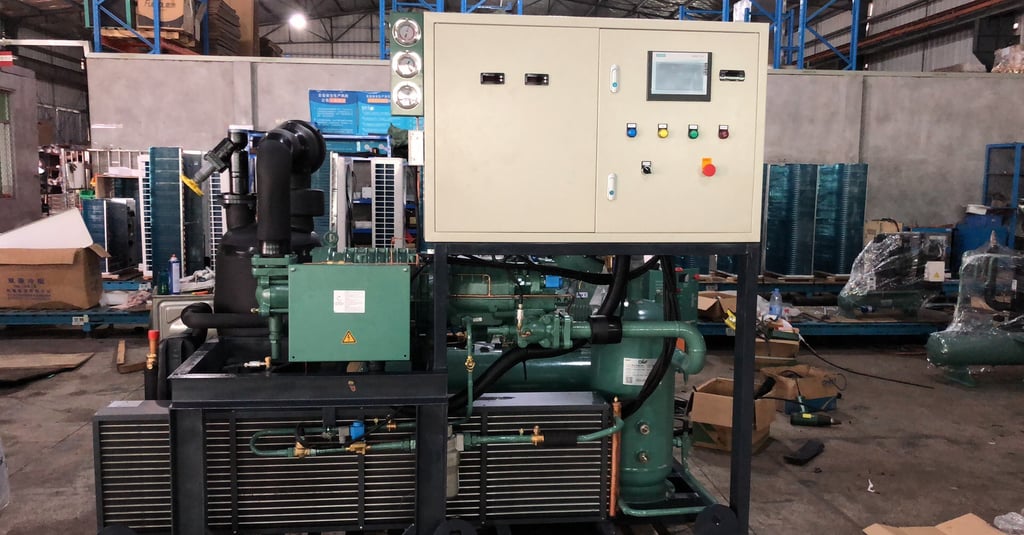Revolutionizing Somali Fisheries: The Cold Storage Project
The Somalia Cold Storage Project involves the establishment of a state-of-the-art frozen storage facility aimed at enhancing local fisheries.
PROJECT
3/29/20204 分钟阅读


Introduction to the Somalia Cold Storage Project
The Somalia Cold Storage Project represents a significant advancement in the local fisheries sector, aimed at enhancing the overall efficiency and sustainability of the industry. This initiative spearheads the development of a state-of-the-art frozen storage facility designed to drastically improve the preservation and quality of seafood produced in Somalia. The project's primary objectives focus on reducing post-harvest losses, ensuring year-round availability of fish products, and opening up new market opportunities both locally and internationally.
Key stakeholders in this transformative project include the Somali government, local fishing communities, and international partners. Central to the initiative is the support from the UK's Department for International Trade (DIT), which has been instrumental in providing technical and financial assistance. The DIT's involvement underscores a broader commitment to bolstering Somalia's supply chain infrastructure, thereby fostering economic growth and food security within the region.
The establishment of the cold storage facility marks a pivotal moment for Somali fisheries. By integrating advanced refrigeration technology, the facility will extend the shelf life of seafood products, ensuring that fish are kept at optimal conditions from the point of capture to the final consumer. This will not only enhance the quality of the seafood but also contribute to the stability of prices, benefiting both producers and consumers.
Furthermore, the project is anticipated to create numerous employment opportunities, stimulate local economies, and promote sustainable fishing practices. By providing the necessary infrastructure to support the fisheries sector, the Somalia Cold Storage Project aims to position the country as a competitive player in the global seafood market. This initiative is a testament to the collaborative efforts of various stakeholders working towards a common goal of revolutionizing the Somali fisheries industry.
Advanced Freezing Technology: Bitzer Screw Compressor Units
The cornerstone of the new cold storage facility's advanced freezing capabilities lies in the deployment of Bitzer screw compressor units. Renowned for their reliability and efficiency, these high-performance compressors are pivotal in modern refrigeration systems. Bitzer screw compressors are engineered to handle varying loads with ease, ensuring optimal performance under diverse operational conditions. This adaptability is crucial for maintaining a stable and efficient cold storage environment, particularly in the dynamic context of the Somali fisheries industry.
These compressors excel in their ability to rapidly freeze fish and seafood products, a critical factor in preserving the freshness and nutritional value of the catch. By ensuring that the seafood is quickly brought to the required freezing temperatures, Bitzer screw compressors help in maintaining the intrinsic quality of the fish. This swift freezing process not only preserves the taste and texture of the seafood but also extends its shelf life, making it more viable for both local consumption and international export.
Moreover, Bitzer screw compressor units are designed with energy efficiency in mind. They employ advanced technology to minimize energy consumption while maximizing refrigeration output. This energy-efficient operation translates to lower operational costs and reduced environmental impact, aligning with sustainable practices in the fisheries sector. The use of these compressors underscores a commitment to both economic and environmental sustainability, key considerations in the development of the Somali fisheries industry.
The reliability of Bitzer screw compressors further ensures minimal downtime and consistent performance. In an industry where timing is critical, especially in the handling and processing of perishable goods, the dependability of these compressors cannot be overstated. Their robust design and proven track record in similar applications worldwide make them an ideal choice for the cold storage project, promising enhanced stability and efficiency in the refrigeration process.
In summary, the integration of Bitzer screw compressor units into the cold storage facility represents a significant technological advancement. These compressors not only enhance the efficiency and reliability of the refrigeration system but also play a vital role in preserving the quality of Somali seafood, thereby supporting the growth and sustainability of the local fisheries industry.
Impact on Local Fisheries and the Supply Chain
The introduction of the cold storage facility is poised to significantly transform the local fisheries and supply chain landscape in Somalia. By providing advanced seafood preservation capabilities, this facility will drastically reduce the amount of fish lost to spoilage, thereby enhancing the overall efficiency of the fisheries sector. The ability to extend the shelf life of fish products allows local fishermen to maximize their catch's value, ensuring that more of their hard-earned efforts translate into economic gain.
One of the most immediate benefits of the cold storage facility is the potential for increased market access. With enhanced preservation methods, fish products can be stored for longer periods, enabling local businesses to meet the demands of both domestic and international markets more effectively. This not only opens up new revenue streams but also fosters economic stability for those involved in the fisheries sector. By reducing the pressure to sell fresh catch immediately, fishermen can negotiate better prices, ultimately leading to improved income and livelihoods.
Additionally, the cold storage facility is expected to bolster the local economy by creating jobs and stimulating related industries. From transportation and logistics to packaging and retail, the positive ripple effects of this infrastructure investment will be felt across various sectors. Improved infrastructure also means that fishing communities can adopt more sustainable practices, as the need for overfishing to meet immediate market demands diminishes. This, in turn, supports the long-term health of marine ecosystems and ensures a stable supply of fish for future generations.
Moreover, the facility's role in reducing waste cannot be overstated. By minimizing spoilage, the cold storage project aligns with broader environmental sustainability goals. This efficient use of resources contributes to a more resilient and self-sufficient local economy. Ultimately, the cold storage facility stands as a cornerstone for fostering sustainable fishing practices and supporting the livelihoods of Somali fishing communities.
